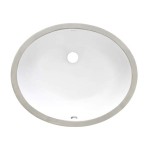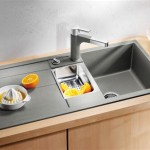Stainless Steel Sink Gauge Chart
When selecting a stainless steel sink, one of the key factors to consider is the gauge. The gauge refers to the thickness of the steel used to make the sink, and it can have a significant impact on the sink's durability, performance, and overall quality. Here's a comprehensive guide to stainless steel sink gauge chart to help you make an informed decision.
Gauge Measurement
Stainless steel sink gauge is typically measured in numbers, with lower numbers indicating thicker steel. The most common gauges for residential sinks range from 16 to 22, with 16 being the thickest and 22 being the thinnest. The gauge number corresponds to the thickness of the steel in thousandths of an inch. For example, a 16-gauge sink has a steel thickness of 16/1000 inches, while an 18-gauge sink has a steel thickness of 18/1000 inches.
Impact on Durability
The gauge of a stainless steel sink directly affects its durability. Thicker gauge sinks are more resistant to dents, scratches, and warping, making them more durable and long-lasting. Thinner gauge sinks, on the other hand, are more susceptible to damage and may not withstand heavy use or impact as well.
Sound Dampening
The gauge of a stainless steel sink also influences its sound dampening properties. Thicker gauge sinks are quieter than thinner gauge sinks, as they absorb sound vibrations more effectively. This can be a valuable feature if you want to minimize the noise level in your kitchen.
Heat Resistance
Stainless steel sinks with a thicker gauge are better at resisting heat than thinner gauge sinks. This is because thicker steel has a higher thermal mass, which means it takes more energy to heat up. As a result, thicker gauge sinks can withstand exposure to hot pots and pans without warping or discoloring.
Ease of Cleaning
Thicker gauge stainless steel sinks are generally easier to clean than thinner gauge sinks. The thicker steel is less prone to scratching, which makes it less likely to trap dirt and bacteria. Additionally, thicker gauge sinks are more resistant to corrosion, which can make them easier to maintain over time.
Price Considerations
As a general rule, thicker gauge stainless steel sinks are more expensive than thinner gauge sinks. This is because thicker steel requires more material and is more difficult to manufacture. However, the added durability and performance benefits of a thicker gauge sink may be worth the additional investment.
Choosing the Right Gauge
The ideal gauge for your stainless steel sink will depend on your individual needs and preferences. If you're looking for a sink that is highly durable, quiet, and easy to clean, then a thicker gauge sink (16-18 gauge) is recommended. If you're on a tighter budget or don't need the same level of performance, then a thinner gauge sink (19-22 gauge) may be a suitable option.

What Is Sink Gauge Stainless Com

Everything You Need To Know About Stainless Steel Sinks Chica Dragon

What Are 16 Gauge Stainless Steel Sinks Chica Dragon

What Are 16 Gauge Stainless Steel Sinks

Stainless Steel Gauge Chart Astm A480 In Mm

Delta Lenta 16 Gauge Stainless Steel 26 In Single Bowl Undermount Kitchen Sink With Accessories 953034 26s Ss The Home

Terminology In The Kitchen Sink Industry A Quartz

The Ultimate Guide To Choosing A Durable Stainless Steel Kitchen Sink

Sheet Metal Gauge Thickness Chart All Points Fasteners

Elkay Pergola 25 In Drop Single Bowl 20 Gauge Stainless Steel Kitchen Ada Sink Only Hdsb25226ada The Home







